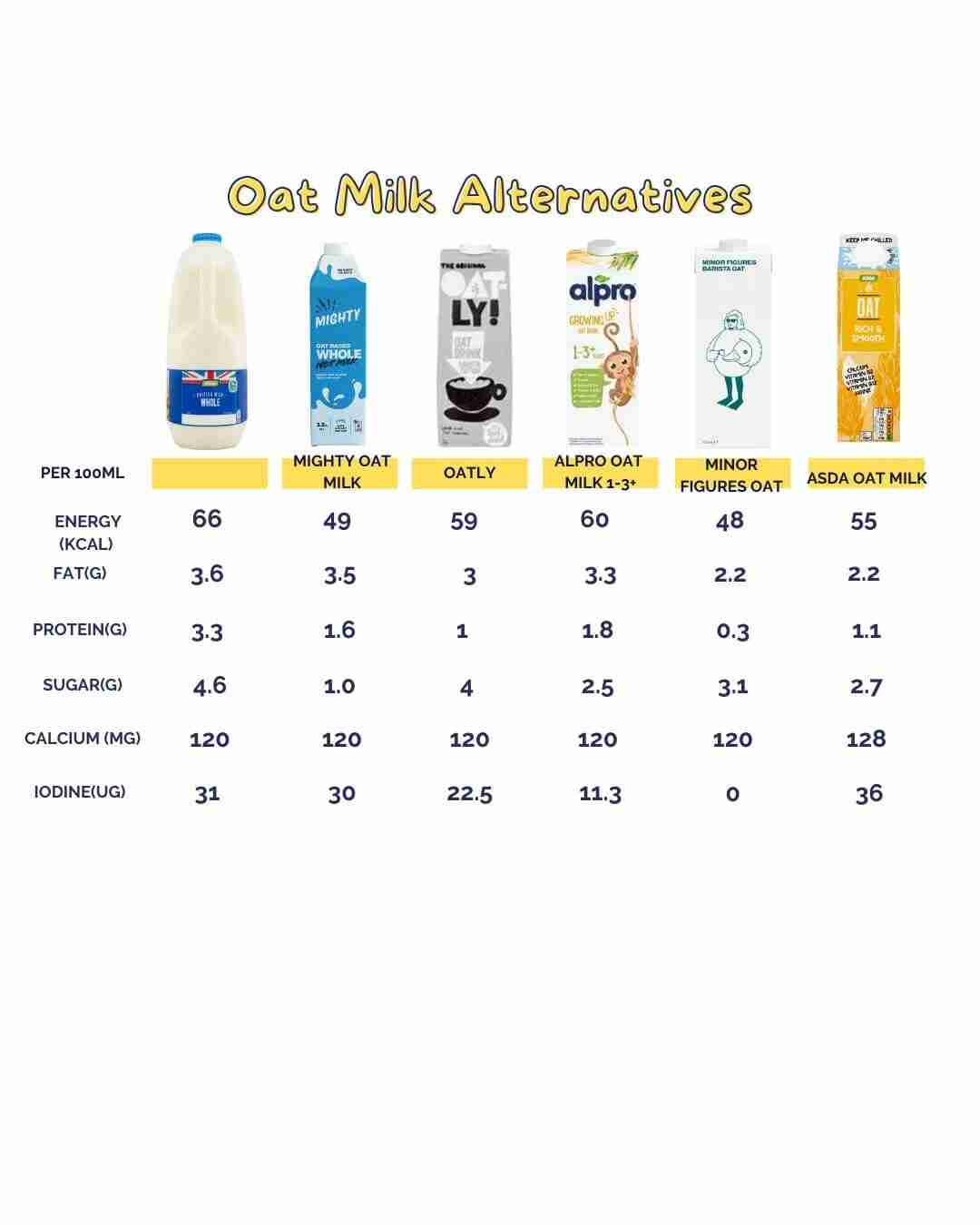Oat milk or dairy milk alternatives are everywhere in the supermarkets now. But as a parent of a toddler with a milk allergy, ensuring they receives optimal nutrition is important. It’s a time when their bodies and brains are developing rapidly and providing them with the right nutrients is crucial for their growth and development.
As an expert paediatric dietitian, I understand the concerns and questions parents may have about introducing oat milks into their toddler’s diet. In this blog, we will be exploring oat milks nutritional value, benefits, and how it can be incorporated into a balanced diet for toddlers.
What is Oat Milk
Oat milk is a popular non-dairy milk alternative that is made from whole oats and water. Oat milk is an alternative option for those who are lactose intolerant or have a cow’s milk allergy, as it is free from dairy, soy, and nuts.
How to make oat milk at home
Oat milk can also be made at home using a simple process. First, you will need to soak whole oats in water for several hours or overnight. This helps to soften the oats and make them easier to blend. Once the oats have soaked, they are blended with fresh water until smooth. The mixture is then strained through a fine mesh strainer or cheesecloth to remove any solids.
The resulting liquid is a creamy, slightly sweet milk. But there are lots of options to buy it too. It is important to choose a fortified version with added vitamins.

Oat milk can be a good choice for toddlers for a few reasons:
Nutritional content:
Choose an oat milk that is fortified with calcium, iodine and vitamin D, which are important nutrients for growing children. It is also a good source of soluble fibre, which can help with digestion and constipation.
Allergen-friendly:
Oat milk is a great alternative for those who allergic or sensitive to cow’s milk or other animal milks. Oat milk provides a plant-based alternative that is free from common allergens like dairy, soy, and nuts.
Taste and texture:
Oat milk has a mild, slightly sweet taste that many toddlers enjoy. It also has a creamy texture that can be like cow’s milk, which means it can be great to use in cooking.
Oat milk for babies under 1
Oat milk is not suitable as a main drink until your baby is at least one year old. It can however, be used in cooking and prepared food before 1 years old.
Rich in nutrients:
If the oat milk you buy is fortified it can be a good source of essential vitamins and minerals such as calcium, vitamin D, vitamin B12, and iron, which are important for a toddler’s growth and development.

Vitamins and Minerals in Oat Milk
Oat milk contains several vitamins and minerals which are often added:
Vitamins in Oat Milk
Vitamin B2: Also known as riboflavin, vitamin B2 is important for maintaining healthy skin, eyes, and nervous system. It also helps convert food into energy.
Vitamin B12: Vitamin B12 is crucial for maintaining healthy nerve cells and red blood cells. It also plays a key role in DNA synthesis.
Vitamin D: Oat milk is often fortified with vitamin D, which is important for maintaining healthy bones and teeth. It also helps the body absorb calcium and supports the immune system.
Vitamin A: Oat milk is also a good source of vitamin A, which is essential for maintaining healthy vision, skin, and immune system.
Minerals in Oat Milk
Calcium: Oat milk is often fortified with calcium, which is essential for building and maintaining strong bones and teeth.
Iron: Iron is important to produce red blood cells, which carry oxygen throughout the body. Oat milk contains a small amount of iron, which can be beneficial if you have a fussy eater.
Magnesium: Magnesium is important for maintaining healthy muscles and nerves, regulating blood sugar levels, and supporting the immune system.
Phosphorus: Phosphorus is important for maintaining healthy bones and teeth, as well as for energy production and cell growth.
Protein Content in Oat Milk
Oat milk is not as protein-rich as cow’s milk or soy milk. This is because oats, the main ingredient in oat milk, are not a significant source of protein.
The amount of protein in oat milk can vary depending on the brand and the way it is processed.
For example; Alpro growing up milk 1-3 years old contains 1.8g of protein per 100ml, Oatly barista edition contains 1.1g per 100ml compared to cow’s milk which has 3.5g per 100ml.
Carbohydrates in Oat Milk
The amount of carbohydrates in oat milk can vary depending on the brand and the type of oat milk. Alpro growing up milk 1-3 years old contains 7.1g per 100ml compared to 4.6g per 100ml in whole cow’s milk.
Most of the carbohydrates in oat milk come from the natural sugars found in oats. Oats contain a type of carbohydrate called beta-glucans, which are known for their ability to lower cholesterol levels and improve blood sugar control.
It’s important to note that some brands of oat milk may contain added sugars, which can significantly increase the carbohydrate content. When choosing oat milk, it’s a good idea to read the label carefully and opt for brands that don’t contain added sugars or sweeteners.
Fibre Content in Oat Milk
The fibre content in oat milk can vary depending on the brand and any additional ingredients that may have been added. For example, Oatly barista contains 0.8g of fibre compared to 0g in full fat cow’s milk.
Choosing the Right Oat Milk for Your Toddler
Best oat milk for toddlers
When choosing oat milk for your toddler, it is essential to check the ingredients and ensure that it is fortified with vitamins and minerals.

As a paediatric dietitian the best oat milk for 1 year old would be Oatly Barista, Alpro growing up oat milk or Asda oat milk, which is often the cheapest option.
But keep an eye out for special offers and stock up when you can. As allergy parents we know plant based milks are much more expensive than cow’s milk.
Start with small amounts
Introducing oat milk to your toddler gradually is crucial. Start with small amounts of oat milk mixed with their regular milk or formula. You can also add a small amount of oat milk to their cereal or porridge to help them get used to the taste. I found oat milk tasted better when cooking with it compared to other milk alternatives.
Make it fun
Toddlers love fun and exciting things, so make drinking oat milk fun for them. You can add a fun straw or put the oat milk in a cup to make it more appealing. You can also use oat milk to make smoothies or other tasty treats.
Be a good role model
Toddlers learn by watching and imitating their parents, so if you want them to drink oat milk, you need to lead by example. Drink oat milk in front of your toddler, and they will be more likely to try it themselves.
Recipes that include oat milk for toddlers
Here are a few options of recipes which you can use oat milk in:
Oat pancakes and raspberries
The advantage of this recipe is that is it gluten free. For the recipes click here.
Vegan Mac and Cheese
This recipe is dairy free and includes nutritional yeast as a cheese substitute and is a good source of vitamin B12. For the recipes click here.
Vegan blueberry muffins
This recipe is full of seeds and is a great breakfast option. Click here for the recipe.
How much oat milk for a 1 year old?
Try to give your child no more than 400ml of milk a day. The American Academy of Pediatrics recommends that toddlers between the ages of 1 and 2 consume approximately 2-3 servings of dairy or dairy alternatives, such as oat milk, per day.
However, the exact amount of oat milk a toddler should consume will depend on their overall diet and nutritional needs, as well as any specific dietary restrictions or health concerns they may have.
It’s important to note that while oat milk can be a nutritious alternative to dairy milk, it should not be the sole source of a toddler’s nutrition. A balanced and varied diet that includes a variety of whole foods is essential for optimal growth and development.
It’s always a good idea to speak to your registered dietitian to determine the appropriate amount of oat milk for your toddler based on their individual needs and dietary requirements.
Conclusion
In conclusion, introducing oat milk into your toddler’s diet can be a beneficial choice, especially for those with a cow’s milk allergy. Oat milk provides essential nutrients such as calcium, vitamin D, and fibre, supporting your child’s growth and development. It is allergen-friendly and has a mild, slightly sweet taste that many toddlers enjoy.
If you would like help with weaning with a milk allergy download my 5 Top Tips for Weaning with a Milk Allergy.
As a mum and a dietitian, I know how stressful it can be to live through a milk allergy. If you are worried about your child’s nutrition, book a free call or check out my consultation package to see if I can help your child thrive with a milk allergy.
Written by Emma Shafqat, Paediatric Dietitian RD. The information is correct at the time of publishing the blog.



